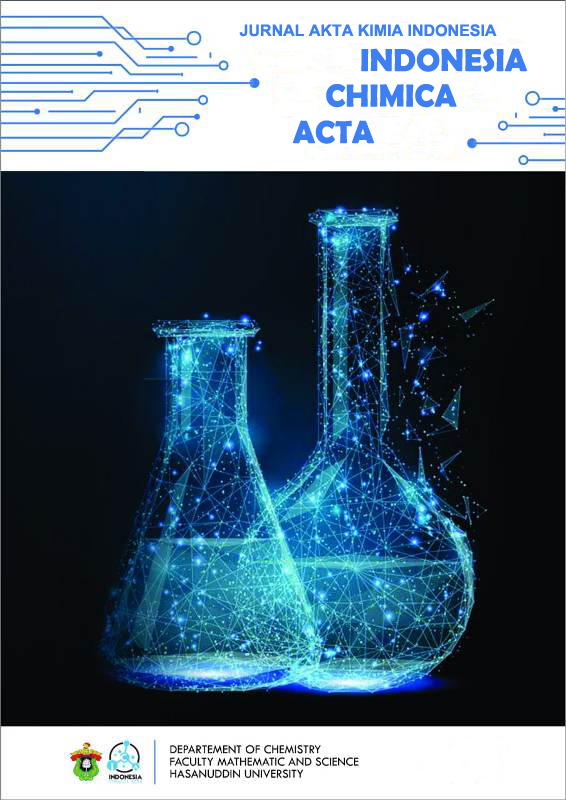IDENTIFICATION OF ORGANIC COMPOUNDS FROM EXTRACT LOTUS SEEDS (Nelumbo nucifera)
Abstract
Abstract. Seeds of Nelumbo nucifera is many found in Indonesia. South Sulawesi is one of the most potencial provine swamp of Indonesia. The Phytochemical test of this plant contain of alkaloid, tanin, saponin, steroid, terpenoid and flavonoid from methanol exract sample, n-hexane, chloroform and ethanol. The result of this phytochemical test is positively contain of terpenoid, tanin, and saponin; chloroform extract positively contain of alkaloid, terpenoid, and tanin; ethanol extract positively contain of flavonoid, tannin, and saponnin; n-hexane extract showed the negative result of this test.
Full text article
References
Ahmad, S.A., 1986, Organic Chemistry Natural Compounds, Karunika Open University, Jakarta, pp. 65-73.
Astuti and Agung, S., 2007, Encyclopedia of Ornamental Plants, Agro Media Pustaka, South Jakarta.
Baehaki, A., Lestari, S.D., and Apriani, W., 2015, Phytochemical Content of Lotus Seeds (Nelumbo nucifera Gertn.) From Swamp Waters, Proceedings of the Suboptima Land National Seminar.
Budini, R., Tonelli, D., and Girotti, S., 1980, Analysis of Total Phenols using The Prussian Blue Method, J. Agric. Food Chem, 28, 1236.
Harborne, J.B., 1987, Phytochemical Methods. Guide to the Modern Ways of Analyzing Plants, Transfer Language Kosasih Padmawinata, ITB Bandung, pp. 1-107.
Khopkar, 2008, Concept of Chemical Analysis, Jakarta, University of Indonesia.
Markham, K.R., 1988, How to Identify Flavonoids, was translated by Kosasih, Padmawinata, 15, ITB Publisher, Bandung.
Mukherjee, P.K .; Mukherjee, D .; Maji, A.K .; Rai, S. Mukherjee, P.K .; Saha K .; Pal, M .; Saha, B.P. & Heinrich, M. 2009. The sacred lotus (Nelumbo nucifera) - phytochemical and therapeutic profile. Journal of Pharmacy and Pharmacology, 61: 407–422.
Odeoga, H.O., D.E. Okwu, and B.O. Mbaebie, 2005, Phytochemical constituents of some Nigerian medicinal plants, African Journal of Biotechnology Vol. 4 (7), 685-688.
Robinson, Trevor, 1995, High Plant Organic Content, ITB, Bandung, pp. 71-28.
Sridhar, K.R, and Rajeev, B., 2007, Lotus - A potential nutraceutical source, Journal of Agricultural Technology 3: 143-155.
Voight, R., 1995, Technology Textbooks, Pharmacy, Translated by Soedani Noerono Soewandi, Apt. Yogyakarta, Gajah Mada University press.
Wu, M.J., Wang, L., Weng, C.Y, and Yen, J.H., 2003, Antioxidant activity of methanol extract of the lotus leaf (Nelumbo nucifera Gertn.), American Journal of Chinese Medicine 31: 687-698
Zhu, MZ, Wu, W., Jiao, LL, Yang, PF, and Quo, MQ, 2015, Analysis of Flavonoids in Lotus (Nelumbo nucifera) Leaves and Their Antioxidant Activity Using Macroporous Resin Chromatography Coupled with LC-MS / MS and Antioxidant Biochemical Assays, Open Access Molecules., 20, 10553-10565.
Authors
This is an open access journal which means that all contents is freely available without charge to the user or his/her institution. Users are allowed to read, download, copy, distribute, print, search, or link to the full texts of the articles in this journal without asking prior permission from the publisher or the author.
Jurnal Akta Kimia Indonesia (Indonesia Chimica Acta) operates a CC BY-SA 4.0 © license for journal papers. Copyright remains with the author, but Jurnal Akta Kimia Indonesia (Indonesia Chimica Acta) is licensed to publish the paper, and the author agrees to make the article available with the CC BY-SA 4.0 license. Reproduction as another journal article in whole or in part would be plagiarism. Jurnal Akta Kimia Indonesia (Indonesia Chimica Acta) reserves all rights except those granted in this copyright notice.

